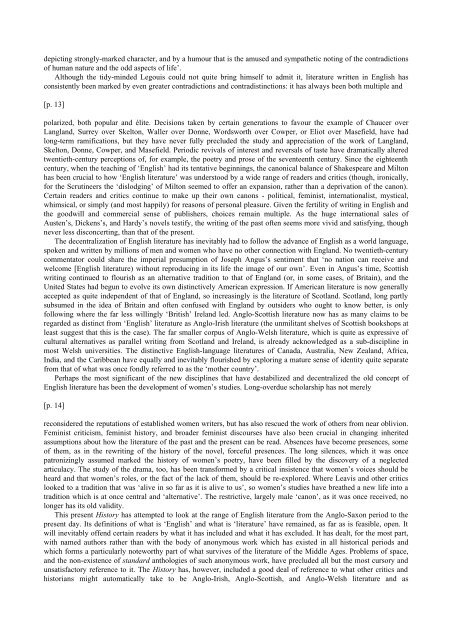THE SHORT OXFORD HISTORY OF ENGLISH LITERATURE
THE SHORT OXFORD HISTORY OF ENGLISH LITERATURE
THE SHORT OXFORD HISTORY OF ENGLISH LITERATURE
Create successful ePaper yourself
Turn your PDF publications into a flip-book with our unique Google optimized e-Paper software.
depicting strongly-marked character, and by a humour that is the amused and sympathetic noting of the contradictions<br />
of human nature and the odd aspects of life’.<br />
Although the tidy-minded Legouis could not quite bring himself to admit it, literature written in English has<br />
consistently been marked by even greater contradictions and contradistinctions: it has always been both multiple and<br />
[p. 13]<br />
polarized, both popular and élite. Decisions taken by certain generations to favour the example of Chaucer over<br />
Langland, Surrey over Skelton, Waller over Donne, Wordsworth over Cowper, or Eliot over Masefield, have had<br />
long-term ramifications, but they have never fully precluded the study and appreciation of the work of Langland,<br />
Skelton, Donne, Cowper, and Masefield. Periodic revivals of interest and reversals of taste have dramatically altered<br />
twentieth-century perceptions of, for example, the poetry and prose of the seventeenth century. Since the eighteenth<br />
century, when the teaching of ‘English’ had its tentative beginnings, the canonical balance of Shakespeare and Milton<br />
has been crucial to how ‘English literature’ was understood by a wide range of readers and critics (though, ironically,<br />
for the Scrutineers the ‘dislodging’ of Milton seemed to offer an expansion, rather than a deprivation of the canon).<br />
Certain readers and critics continue to make up their own canons - political, feminist, internationalist, mystical,<br />
whimsical, or simply (and most happily) for reasons of personal pleasure. Given the fertility of writing in English and<br />
the goodwill and commercial sense of publishers, choices remain multiple. As the huge international sales of<br />
Austen’s, Dickens’s, and Hardy’s novels testify, the writing of the past often seems more vivid and satisfying, though<br />
never less disconcerting, than that of the present.<br />
The decentralization of English literature has inevitably had to follow the advance of English as a world language,<br />
spoken and written by millions of men and women who have no other connection with England. No twentieth-century<br />
commentator could share the imperial presumption of Joseph Angus’s sentiment that ‘no nation can receive and<br />
welcome [English literature) without reproducing in its life the image of our own’. Even in Angus’s time, Scottish<br />
writing continued to flourish as an alternative tradition to that of England (or, in some cases, of Britain), and the<br />
United States had begun to evolve its own distinctively American expression. If American literature is now generally<br />
accepted as quite independent of that of England, so increasingly is the literature of Scotland. Scotland, long partly<br />
subsumed in the idea of Britain and often confused with England by outsiders who ought to know better, is only<br />
following where the far less willingly ‘British’ Ireland led. Anglo-Scottish literature now has as many claims to be<br />
regarded as distinct from ‘English’ literature as Anglo-Irish literature (the unmilitant shelves of Scottish bookshops at<br />
least suggest that this is the case). The far smaller corpus of Anglo-Welsh literature, which is quite as expressive of<br />
cultural alternatives as parallel writing from Scotland and Ireland, is already acknowledged as a sub-discipline in<br />
most Welsh universities. The distinctive English-language literatures of Canada, Australia, New Zealand, Africa,<br />
India, and the Caribbean have equally and inevitably flourished by exploring a mature sense of identity quite separate<br />
from that of what was once fondly referred to as the ‘mother country’.<br />
Perhaps the most significant of the new disciplines that have destabilized and decentralized the old concept of<br />
English literature has been the development of women’s studies. Long-overdue scholarship has not merely<br />
[p. 14]<br />
reconsidered the reputations of established women writers, but has also rescued the work of others from near oblivion.<br />
Feminist criticism, feminist history, and broader feminist discourses have also been crucial in changing inherited<br />
assumptions about how the literature of the past and the present can be read. Absences have become presences, some<br />
of them, as in the rewriting of the history of the novel, forceful presences. The long silences, which it was once<br />
patronizingly assumed marked the history of women’s poetry, have been filled by the discovery of a neglected<br />
articulacy. The study of the drama, too, has been transformed by a critical insistence that women’s voices should be<br />
heard and that women’s roles, or the fact of the lack of them, should be re-explored. Where Leavis and other critics<br />
looked to a tradition that was ‘alive in so far as it is alive to us’, so women’s studies have breathed a new life into a<br />
tradition which is at once central and ‘alternative’. The restrictive, largely male ‘canon’, as it was once received, no<br />
longer has its old validity.<br />
This present History has attempted to look at the range of English literature from the Anglo-Saxon period to the<br />
present day. Its definitions of what is ‘English’ and what is ‘literature’ have remained, as far as is feasible, open. It<br />
will inevitably offend certain readers by what it has included and what it has excluded. It has dealt, for the most part,<br />
with named authors rather than with the body of anonymous work which has existed in all historical periods and<br />
which forms a particularly noteworthy part of what survives of the literature of the Middle Ages. Problems of space,<br />
and the non-existence of standard anthologies of such anonymous work, have precluded all but the most cursory and<br />
unsatisfactory reference to it. The History has, however, included a good deal of reference to what other critics and<br />
historians might automatically take to be Anglo-Irish, Anglo-Scottish, and Anglo-Welsh literature and as









